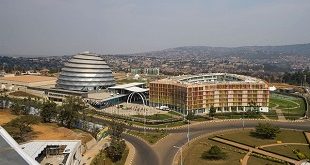
By Andrew M. Mwenda
An inside account of the war between Museveni and Mbabazi
In 2012, President Yoweri Museveni wrote an unusual letter to the Governor of the Bank of Uganda, Emmanuel Tumusime-Mutebile. The President, sources say, told the governor that he had received persistent reports that Amos Nzeyi, the largest shareholder in the National Bank of Commerce (NBC), was withdrawing Shs8 billion per month from the bank and “stashing” it in numbered accounts in Dubai and China.
The motive behind this, Museveni reasoned, was to build a huge fund to act as a financial war chest for the presidential ambitions of Prime Minister Amama Mbabazi come 2016.

The President asked the governor to investigate the claims. Recently, Mutebile confirmed to The Independent that Museveni wrote the letter to him but he insists the President did not mention Mbabazi or the campaign war-chest. Mutebile says the President only alleged that Nzeyi was taking out money from the bank.
Mbabazi was the second largest shareholder in NBC after Nzeyi who also happens to be his close friend. However, reliable State House sources say that if the President did not mention Mbabazi specifically, the reports Museveni based on to write the letter to Mutebile explicitly mention that Nzeyi was building a campaign war chest for the Prime Minister to run for the presidency in 2016.
Sources say, and Mutebile confirms, the central bank carried out an investigation which found no evidence of this activity. However, the President also wrote a similar letter to the Inspector General of Police, Gen. Kale Kayihura, asking him to investigate similar allegations.
To date, there is no evidence of the report to Museveni from the police – at least The Independent has not been able to establish police findings. But sources inside State House say that the President has received many reports from the IGP about alleged clandestine activities by Mbabazi, including recruiting a large network of campaign agents.
Many people in the camps of Museveni and Mbabazi say Mbabazi is intent on running for president in 2016 – “whether Museveni is in the race or not.”
Some Mbabazi confidants claim that Museveni and Mbabazi agreed that Museveni would retire in 2016 and let Mbabazi run. They argue that this is the reason the president helped Mbabazi be elected SG and also appointed him prime minister. Now, Mbabazi confidants claim, it is time for Museveni to honour his promise.
“We have supported Museveni for a very long time,” an MP in Mbabazi’s camp told The Independent bluntly but asked for anonymity, “This is our chance to have the presidency. Therefore, if Museveni does not honor his promise to Mbabazi, he can forget our support. We already have enough support inside the NRM to challenge Museveni at the party’s delegates’ conference in 2015 – and win outright.”
This could be a bluff from an overzealous Mbabazi admirer. However, and whatever the prime minister is planning, from the date Museveni wrote to Mutebile, observers say, the Central Bank became concerned.
For example, BoU appointed its official; Abbas Mawanda, to sit inside and supervise NBC. After three months of work, sources say, Mawanda wrote a report which gave the bank a clean bill of health. In spite of this, the Central Bank wrote to NBC asking them to recapitalise the bank. At the time, NBC shareholders argued that it had just injected Shs8billion worth of capital in refitting and refurnishing the bank.
But sources at NBC say BoU rejected the claim and ordered that the Shs8 billion be treated as an ordinary expense rather than as an investment. The Central Bank gave the shareholders one week to raise Shs7 billion. Within a week Mbabazi and Nzeyi had raised the money and injected it into the bank.
A week later, while playing golf, Nzeyi was called by his son Humphrey Nzeyi who was a director at bank telling him that police were surrounding the offices of NBC and that BOU had sold NBC to Crane Bank.
Many observers say the Central Bank was not acting financially but politically. The President’s letter tends to confirm this suspicion – that NBC was closed to cut off the suspected financial artery for Mbabazi’s suspected presidential bid for 2016. Mutebile rejects this accusation and says BOU had had many problems with NBC lasting many years.
Museveni’s shock
Whatever the case, sources say the rivalry between Museveni and Mbabazi began in earnest in 2010 when the later was elected SG of the NRM in a landslide victory against two powerful ruling party functionaries; former vice president, Gilbert Bukenya, and the NRM-historical and fiery Maj. Gen. Kahinda Otafiire.
Although Museveni favoured Mbabazi and financed and directed his campaign, sources close to him say the President was surprised and later frightened by Mbabazi’s margin of victory.
More disturbing to Museveni, sources say, in a post-election assessment, the President realised that Mbabazi had built a strong network of support using his family and security agencies that Museveni did not know about.
Museveni has historically been uncomfortable with strong secretaries general of ruling parties. For example, in November 2005, the president called a meeting which was attended by Mbabazi, Otafiire and Cryspus Kiyongo (now minister of Defense) at State House Nakasero.
The three were in the race for NRM SG and Museveni was wanted Kiyonga and Otafiire to withdraw in favour of Mbabazi. He said the late president of Uganda, Milton Obote, had problems with three of his SGs in the 1960s – John Kakonge, Grace Ibingira, and later Felix Onama.
He said Jomo Kenyatta in Kenya had problems with Tom Mboya, Julius Nyerere in Tanzania with Oscar Kambona, Kenneth Kaunda in Zambia with Simon Kapwempwe and Kamuzu Banda in Malawi with Kanyama Chume. Therefore, Museveni reasoned, the leader of a party needs a “yes man” (someone completely loyal and un-ambitious) for the job. That is why he favoured Mbabazi.
But if Museveni felt this way about Mbabazi in 2005, he seems to have changed his position after 2010. After Mbabazi’s resounding re-election that year, Museveni appointed him Prime Minister.
While many people saw this move as an elevation of Mbabazi to the position of heir apparent, analysts say it was Museveni’s move to attempt to to stop his growing power and influence.
Given that the NRM National Executive Committee had agreed that the SG of the party should not hold another executive job, except as minister without portfolio, appointing Mbabazi Prime Minister was a way for force him to relinquish his elected office in the party.
When Museveni called the first NRM caucus meeting in early 2011 at State House Entebbe, he informed the caucus that he wanted to nominate Edward Sekandi as vice president and Mbabazi as prime minister.
Dokolo County MP Felix Okot Ogong asked the President how Mbabazi could run two busy and powerful offices at the same time when it had been agreed in NEC previously that a secretary general should not be given a substantive ministry.
Ogong argued that the president had at that time also agreed to this NEC position. Ogonga reminded the president that he had argued that even Kizza Besigye, Eriya Kategaya, James Wapakhabulo and later Kiyonga, all of whom had served as National Political Commissars of the NRM/Movement were always ministers without portfolio.
Museveni turned to Mbabazi and asked him to explain. According to sources, Mbabazi began his explanation but his voice was inaudible and the President directed him to go to the microphone so that everyone can hear him clearly.

Mbabazi went to the microphone and told the caucus that he was aware both positions were very busy and one would undermine the ability of the holder to perform the other functions. He promised the caucus that he was going to resign his position as SG.
But Mbabazi did not resign as SG and the bickering went on in the party. Many months later, in 2012, at a meeting of the party’s Central Executive Committee (CEC), Francis Babu asked the president why Mbabazi had not resigned his job as SG. Museveni answered that he had talked to the prime minister who had said he could not resign because of procedural and legal issues.
Museveni told CEC that even before he met the caucus to announce his intensions to appoint Mbabazi prime minister, he had held a meeting with him. He President said Mbabazi had promised to resign the post. So why has he not yet resigned, Museveni was asked? Museveni did not answer this question.
The next day, there was a NEC meeting. Before it could begin, some NRM leaders sought audience with the president. They told him that Mbabazi was busy mobilising NEC members to support his bid to retain both jobs.
Museveni seemed surprised. Some even say they felt he did not believe their claims. During the NEC meeting, Museveni raised the issue of Mbabazi holding both jobs but did not take a position on it.
Mbabazi also gave a speech and for about 30 minutes proceeded to defend his position arguing that an individual can hold two demanding positions and perform well in both of them. For example, Mbabazi opined, the President is leader of the party, president of the country and commander-in-chief of the armed forces and he is doing all of them well.
 The Independent Uganda: You get the Truth we Pay the Price
The Independent Uganda: You get the Truth we Pay the Price



